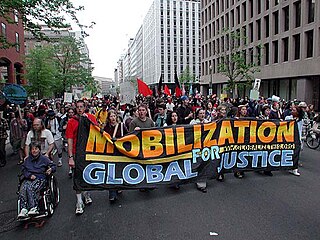
Information to change the world | |
Find Topics, Titles, Names related to your query |

Information to change the world | |
Find Topics, Titles, Names related to your query |
|
|
Global Justice Movement
|
| The examples and perspective in this article may not represent a worldwide view of the subject. Please improve this article and discuss the issue on the talk page. (November 2008) |

The Global Justice Movement is the broad globalized social movement opposing what is often known as –corporate globalization– and promoting equal distribution of economic resources. Its unifying theme is opposition to its view of what tyranny is. A number of organizations and groups using this term have emerged at the beginning of this century - see links and references.
Contents |
The Global Justice Movement describes the loose collection of individuals and groups–often referred to as a –movement of movements––who advocate "fair trade" rules and are negative to current institutions of global economics such as the World Trade Organization.[1][2]
The movement is often labeled the anti-globalization movement by the mainstream media. Those involved, however, frequently deny that they are –anti-globalization,– insisting that they support the globalization of communication and people and oppose only the global expansion of corporate power.[3] The term further indicates an anti-capitalist and universalist perspective on globalization, distinguishing the movement from those opponents of globalization whose politics are based on a conservative defence of national sovereignty.
Important organizational pillars of the movement are Via Campesina, the family farmers' international; Peoples' Global Action, a loose collection of often youthful groups; Jubilee 2000, the Christian-based movement for relieving international debt; Friends of the Earth, the environmentalist international; and some think-tanks like Focus on the Global South and Third World Network [4]. Participants include student groups, NGOs, trade unions, faith-based and peace groups throughout the world. A loose coordination of the movement is taking place on the Social Forums. However, although formal power is often situated in the global South, the resources of North-based NGOs give these disproportionate power to often informally marginalize popular organizations from the South [5].
The movement is characterized by the massive citizen protests and alternative summits which have, for the last decade, accompanied most meetings of the G8, World Trade Organization, International Monetary Fund, and World Bank. The movement came to the attention of many in the US when activists successfully used protests to shut down the 1999 WTO Ministerial in Seattle. This represented, however, just one of a series of massive Global Justice protests that have included protests at the 1988 World Bank/IMF meetings in Germany,[6] "IMF riots" beginning in Lima in 1975, over cuts in the social safety-net presided over by IMF and other international organizations, and spreading through the world,[7][8] and "water wars" in Bolivia and South Africa.[9]
The Global Justice Movement claims to place a significant emphasis on transnational solidarity uniting activists in the global South and global North. Some have argued that the World Social Forum is one excellent example of this emphasis, bringing activists together from around the world to focus on shared philosophy and campaigning. However others see the World Social Forum as dominated by Northern NGOs, donors and activists and argue that Southern representation is largely organized via Northern donors and their NGOs and that popular organizations in the global South are systematically marginalized or included in a deeply subordinated manner.[10]For this reason many grassroots movements in the South boycott the forum and the NGOs that gate-keep representation at the forum or, in some instance, actively oppose it as just one more space of domination.
|
|
This article's use of external links may not follow Wikipedia's policies or guidelines. Please improve this article by removing excessive and inappropriate external links or by converting links into footnote references. |
Related topics in the Connexions Subject Index
Activism/Radicalism –
Alternatives –
Global Justice –
Justice –
Left History –
Libraries & Archives –
Organizations & Movements formed 2000 to present –
Organizations & Movements Listed in Connexipedia –
Social Change –
This article is based on one or more articles in Wikipedia, with modifications and additional content contributed by
Connexions editors. This article, and any information from Wikipedia, is covered by a
Creative Commons Attribution-Sharealike 3.0 Unported License (CC-BY-SA) and the
GNU Free Documentation
License (GFDL).
We welcome your help in improving and expanding the content of Connexipedia articles, and in correcting errors. Connexipedia is not a wiki: please contact Connexions by email if you wish to contribute. We are also looking for contributors interested in writing articles on topics, persons, events and organizations related to social justice and the history of social change movements.
For more information contact Connexions



